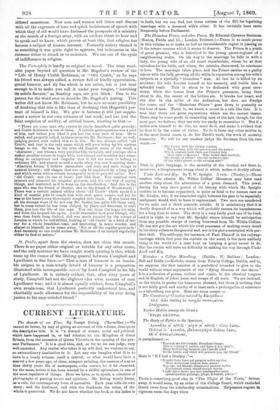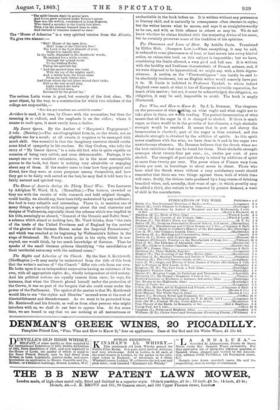Kottabos : a College Miscellany. (Dublin: W. McGhee; London :
Bell and Daldy.)—Kottabos comes from Trinity College, Dublin, and is, we suppose, the first number of a periodical intended to give to the world without some enjoyment of the "flying blossom of the terms." It is a collection of poems, serious and comic, in the classical tongues and in English, of jokes, puns, and scraps of all sorts. We are inclined, on the whole, to prefer the humorous element, but there is nothing that is not fairly good, and worthy of at least such a prolongation of existence as a miscellany can give. Here are some scraps
The Cessation of Crinoline noticed by Euripides-
' AAA.' ,de qraibe;'sa •rpoxiliv lrecraugivott
7..reixoutau.
Yankee Habits among the Greeks.
NErucOs zavicrrue„
The Reply of Pythia to the Spartans,
'Apxceabal airEig • ja.iya aire7; • Oro, 860.,. 110XXol iv Aput314, PotAconpari (Ups; greasy, 07 fi cirozwX6crouely,
is paraphrased :—
"You ask me for Canada, President Grant; This is coming it, rather, and have it you shan't ; Many beef-eating farmers can Canada send To the battle, and may will prevent you, my friend."
Here is "If I had a Donkey :"—
" Si mihi forte foret qui pergere nollet asellus, Mene dolaturum tergora taste putes?
Non ego, sed blandis demulcens peotora verbis Nutriment& simul, blanditiasque darom. I mild dulee demo quo non praestantior alter. Quadrupedum princeps, purge, Eduarde, precor !"
There is something good also in "The Flight of the Muses," driven away, it would seem, by an order of the College Board, which excluded Greek verse from the scholarship examinations. Melpomene regrets in vigorous verse the days when
"The mild Caesura dealt its genial laws,
And boors grew polished under Person's pause. Base was the wretch, condemned to long disgrace. Who dared a spondee in the fourth foot place. Then e'en the peasant boasted lines to scan, And learned to venerate himself as man."
The "House of Admetus" is a very spirited version from the Alcestis. We give two stanzas:—
"Hail! House of the open door,
Hail! home of the Chieftain free !
The Lord of the Lyre himself of yore, Deign'd to inhabit thee.
In thy halls, disguised in his shepherds' weeds, He endured for a while to stay, Through the upland rocks To the feeding flocks, Piping the pastoral lay.
"And the spotted lynx was tame, With the joy of the mighty spell ; And, a tawny host, the Lions came From the leafy Othrys dell; And from where the tall pines waved their locks, Still as the lute would play, Light tripped the fawn O'er the level lawn, Entranced by the genial lay."
The serious Latin verso is good, but scarcely of the first class. We must object, by the way, to a construction for which two scholars of the college are responsible,—
" Nos des per tenebras nos arridebit euntes."
Arrickre is used, it is true, by Cicero with the accusative, but then the meaning is to ridicule, and the emphasis is on the ridere ; whore it means to smile upon, it must surely have a dative.































 Previous page
Previous page